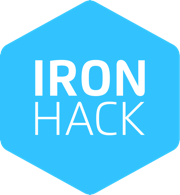Do you know Bulma, a very nice alternative to Bootstrap as a CSS framework? We are going to create a simple website with Bulma and React!
- Fork this repo
- Clone this repo
You can find the starter code in the starter code folder of this GitHub repo.
-
Upon completion, run the following commands
git add . git commit -m "done" git push origin master -
Create Pull Request so your TAs can check up your work.
First let's get set up:
- After forking and cloning, run
npm install. - Install the
reactandreact-dompackages.
$ npm install react react-domTo get Bulma, install the npm package:
$ npm install bulma
You will have to import Bulma CSS in every component that will use it. You can do it with the following line:
import 'bulma/css/bulma.css';To kick off, create a new folder src/navbar and inside create two files:
src/navbar/Navbar.jsandsrc/navbar/Navbar.css.
This component should display a link to "Home", "Login" and "Signup" like in the following example:
To help you, you can use the code from the Bulma Transparent Navbar.
In the end, you will need to import this component into the src/App.js and use it properly in the return statement, instead of the h1 tag which is there for now.
Following the previous example, create a new folder src/formfield and inside create two files:
src/formfield/FormField.jsandsrc/formfield/FormField.css.
Now it's time to create a new component FormField we will use multiple times in the future.
// JSX version
<FormField label="Name" type="text" placeholder="e.g Alex Smith" />
<FormField label="Email" type="email" placeholder="e.g. alexsmith@gmail.com" /><!-- What is rendered in the DOM -->
<div class="field">
<label class="label">Name</label>
<div class="control">
<input class="input" type="text" placeholder="e.g Alex Smith" />
</div>
</div>
<div class="field">
<label class="label">Email</label>
<div class="control">
<input class="input" type="email" placeholder="e.g. alexsmith@gmail.com" />
</div>
</div>What is visually rendered
As we can see, there are similarities between each of the FormFields so it would be the best to pass props that will fill in different label tags, as well as type and placeholder attributes. To give you a hint, check the following code snippet:
const FormField = props => {
return (
<div className='field'>
<label className='label'>{props.label}</label>
// some other code goes here
</div>
);
};Follow the folder/file pattern as we instructed you in the first two iterations.
The goal is to create a component called CoolButton that creates a <button> with the nice Bulma classes.
You will find the Bulma buttons documentation here: https://bulma.io/documentation/elements/button/
// JSX version
<CoolButton isSmall isDanger className="is-rounded my-class">Button 1</CoolButton>
<CoolButton isSmall isSuccess>Button 2</CoolButton><!-- What is rendered in the DOM -->
<button class="button is-rounded my-class is-danger is-small">Button 1</button>
<button class="button is-small is-success">Button 2</button>What is visually rendered
Because there are many cases to code, focus on the following classes: is-primary, is-success, is-danger.
If you need any help, you can have a look how to take the content between an opening tag and a closing tag: Children in JSX
Change your Navbar component so it uses the CoolButton component for the "Login" and "Signup" buttons.
If you want, you can do all the cases by using the following object:
{
isActive: 'is-active',
isBlack: 'is-black',
isCentered: 'is-centered',
isDanger: 'is-danger',
isDark: 'is-dark',
isFocused: 'is-focused',
isGrouped: 'is-grouped',
isHovered: 'is-hovered',
isInfo: 'is-info',
isInverted: 'is-inverted',
isLarge: 'is-large',
isLight: 'is-light',
isLink: 'is-link',
isLoading: 'is-loading',
isMedium: 'is-medium',
isOutlined: 'is-outlined',
isPrimary: 'is-primary',
isRight: 'is-right',
isRounded: 'is-rounded',
isSelected: 'is-selected',
isSmall: 'is-small',
isStatic: 'is-static',
isSuccess: 'is-success',
isText: 'is-text',
isWarning: 'is-warning',
isWhite: 'is-white',
}Create a Signup component that contains:
- A
Navbar - A form with
- A
FormFieldfor name - An
FormFieldfor email - A
FormFieldfor password - A
CoolButtonfor submitting the form
- A
Before continuing, ask for feedback from one of your teachers, they will give you a feedback about what you've done.
Then, you can:
- Refactor your code
- Create a
Containercomponent (for the class "container") - Create a
Messagecomponent (see the following explanation)
Now, we are going to create Message component. You can find the documentation on Bulma's website: https://bulma.io/documentation/components/message/
// JSX version
<Message isInfo title='Hello World'>
Lorem ipsum dolor sit amet, consectetur adipiscing elit. <strong>Pellentesque risus mi</strong>.
</Message>What is visually rendered
Happy coding! ❤️




